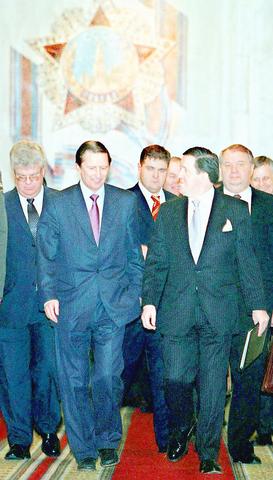Senior Russian officials called yesterday for radical changes in Moscow's relations with NATO, after talks with its Secretary-General George Robertson on plans that could give Russia a long-sought veto in NATO affairs.
Foreign Minister Igor Ivanov and Vladimir Rushailo, secretary of Russia's Security Council, were noticeably upbeat about future ties with Russia's erstwhile Cold War foe, saying relations were moving to a new level.
Russia and NATO "clearly have the political will to undertake far-reaching steps to give a fundamentally new quality to our cooperation," Interfax news agency quoted Ivanov as saying after meeting Robertson.

PHOTO: AP
The NATO secretary-general said on Thursday that the two sides were discussing plans for closer security ties that could imply a Moscow veto in some cases.
"That's one of the implications," Robertson said when asked whether the new proposals would effectively hand Russia a veto in NATO.
"It would depend on the subject matter as well ... but we're not at that stage yet. We're exploring it, and that is one of the implications that would have to be weighed up."
A plan put forward by British Prime Minister Tony Blair envisages inviting Russia to join the alliance's 19 members in the NATO council chamber to discuss specific topics on the basis of equality.
The new Russia-North Atlantic Council would take decisions on a consensus basis. The current Russia-NATO arrangement usually sees the NATO 19 ranged against Russia, a set-up Moscow complains asks it to rubber stamp decisions already taken.
Rushailo seized on Robertson's comments, saying "soon we will move from the `19 plus 1' format to that of 20 equals." But he stressed Russia did not plan to meddle in all alliance affairs.
"Defense issues are an internal matter for the alliance, and NATO itself must define the parameters of its own policies," Interfax quoted him as saying.
"However, the main thing for us at this stage is the broadening of cooperation in the security field, that is the fight against new threats."
These included terrorism, organized crime, non-proliferation of weapons of mass destruction, and cooperation in peacekeeping operations and responding to emergencies, he said.
Robertson was quoted as saying the two sides needed to seek creative solutions in terms of format and content to define their future relations.
Robertson was later to meet President Vladimir Putin, who has made integrating Russia into Western institutions a top priority, despite strong reservations among Russia's military and parts of the foreign policy establishment.
Putin insists that Russia, which remains a nuclear superpower, be treated with respect. "Russia doesn't intend to stand in line for NATO membership," he said on Thursday after meeting foreign policy lawmakers.
In a further sign of warming ties, Robertson made clear on Thursday that the West had re-evaluated Russia's two-year campaign in secessionist Chechnya since the Sept. 11 attacks on the US.
"We may disagree with the means Russia has chosen in the handling of that conflict ... but we have certainly come to see the scourge of terrorism in Chechnya with different eyes."

SECURITY: As China is ‘reshaping’ Hong Kong’s population, Taiwan must raise the eligibility threshold for applications from Hong Kongers, Chiu Chui-cheng said When Hong Kong and Macau citizens apply for residency in Taiwan, it would be under a new category that includes a “national security observation period,” Mainland Affairs Council (MAC) Minister Chiu Chui-cheng (邱垂正) said yesterday. President William Lai (賴清德) on March 13 announced 17 strategies to counter China’s aggression toward Taiwan, including incorporating national security considerations into the review process for residency applications from Hong Kong and Macau citizens. The situation in Hong Kong is constantly changing, Chiu said to media yesterday on the sidelines of the Taipei Technology Run hosted by the Taipei Neihu Technology Park Development Association. With

CARROT AND STICK: While unrelenting in its military threats, China attracted nearly 40,000 Taiwanese to over 400 business events last year Nearly 40,000 Taiwanese last year joined industry events in China, such as conferences and trade fairs, supported by the Chinese government, a study showed yesterday, as Beijing ramps up a charm offensive toward Taipei alongside military pressure. China has long taken a carrot-and-stick approach to Taiwan, threatening it with the prospect of military action while reaching out to those it believes are amenable to Beijing’s point of view. Taiwanese security officials are wary of what they see as Beijing’s influence campaigns to sway public opinion after Taipei and Beijing gradually resumed travel links halted by the COVID-19 pandemic, but the scale of

A US Marine Corps regiment equipped with Naval Strike Missiles (NSM) is set to participate in the upcoming Balikatan 25 exercise in the Luzon Strait, marking the system’s first-ever deployment in the Philippines. US and Philippine officials have separately confirmed that the Navy Marine Expeditionary Ship Interdiction System (NMESIS) — the mobile launch platform for the Naval Strike Missile — would take part in the joint exercise. The missiles are being deployed to “a strategic first island chain chokepoint” in the waters between Taiwan proper and the Philippines, US-based Naval News reported. “The Luzon Strait and Bashi Channel represent a critical access

Pope Francis is be laid to rest on Saturday after lying in state for three days in St Peter’s Basilica, where the faithful are expected to flock to pay their respects to history’s first Latin American pontiff. The cardinals met yesterday in the Vatican’s synod hall to chart the next steps before a conclave begins to choose Francis’ successor, as condolences poured in from around the world. According to current norms, the conclave must begin between May 5 and 10. The cardinals set the funeral for Saturday at 10am in St Peter’s Square, to be celebrated by the dean of the College